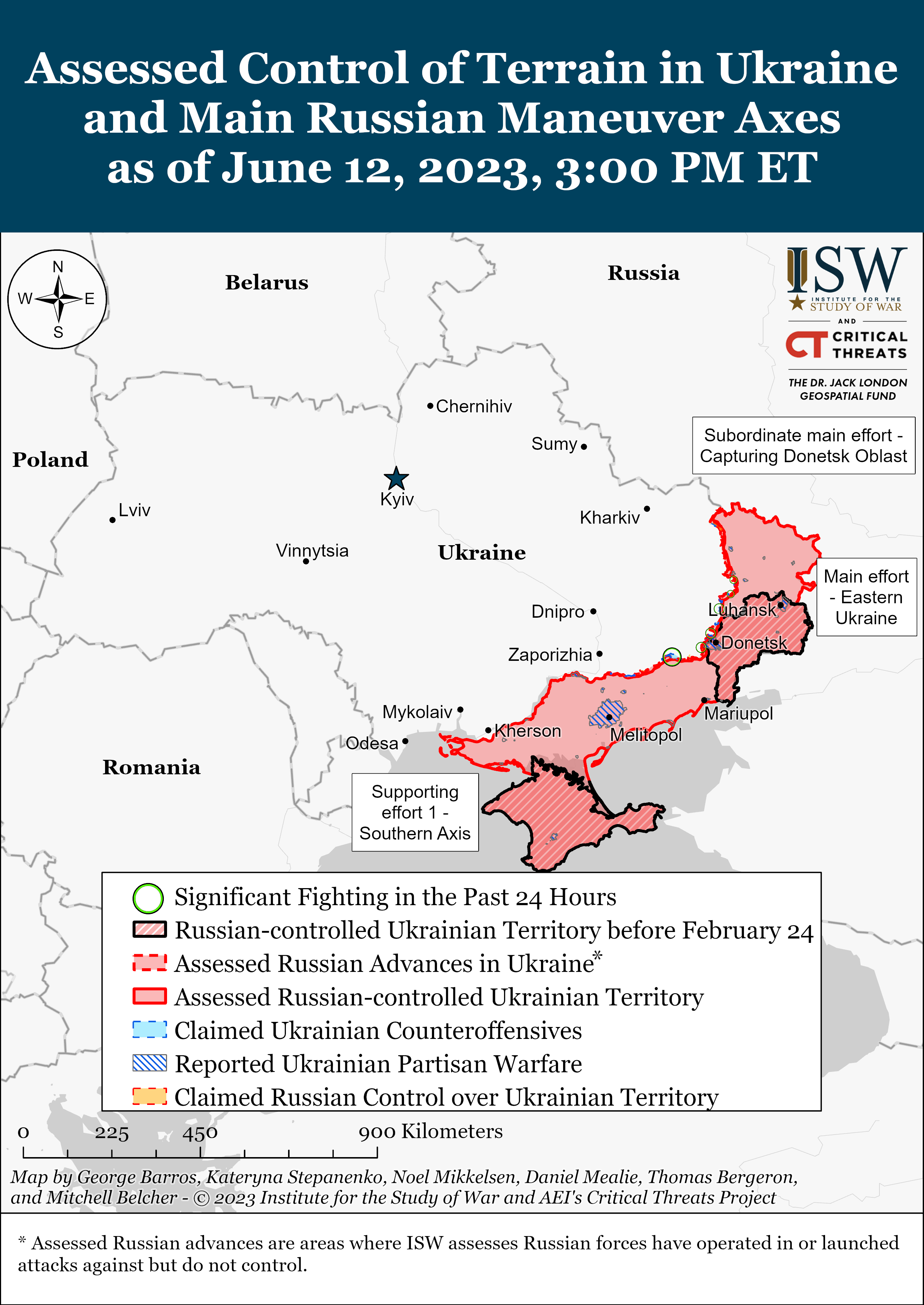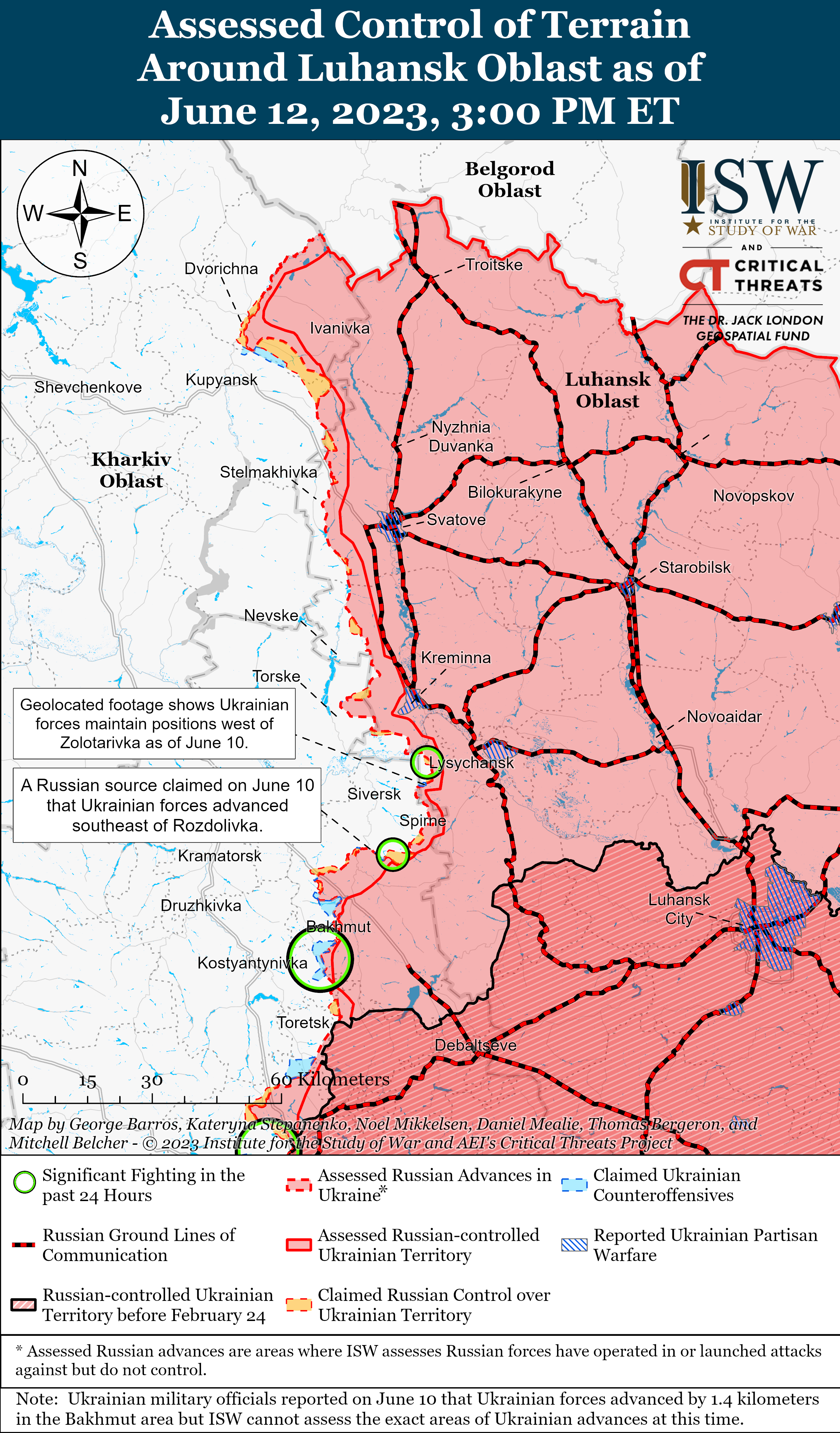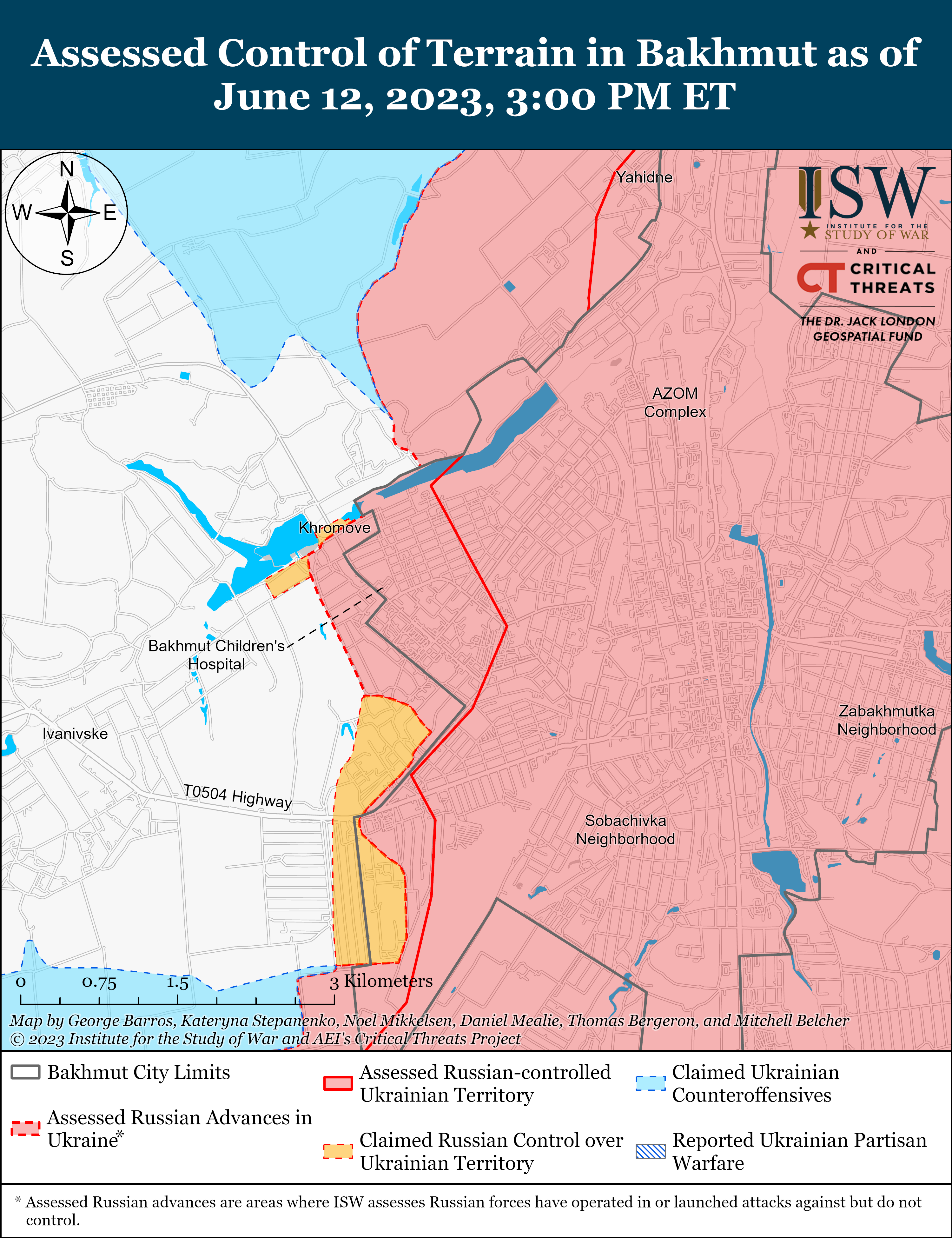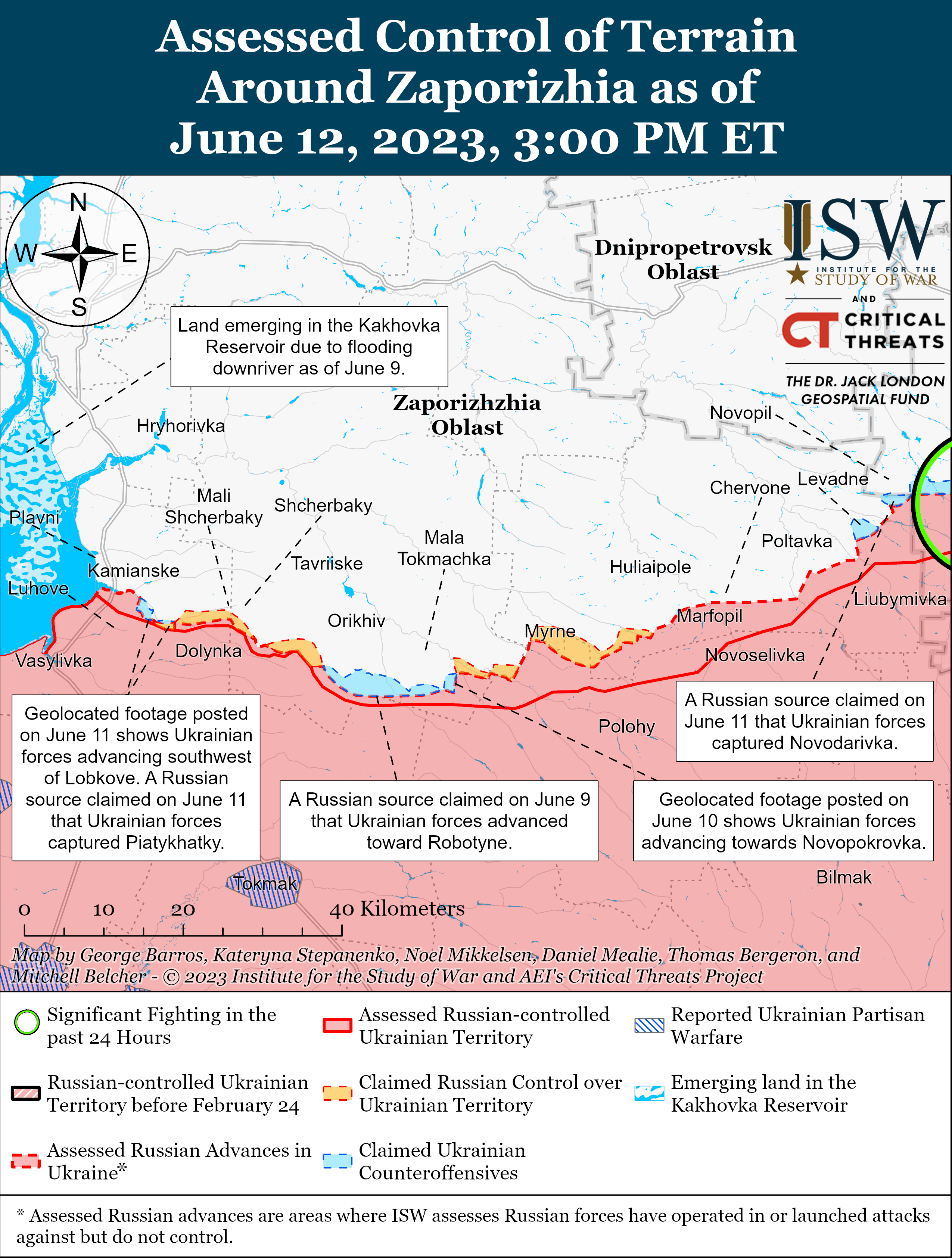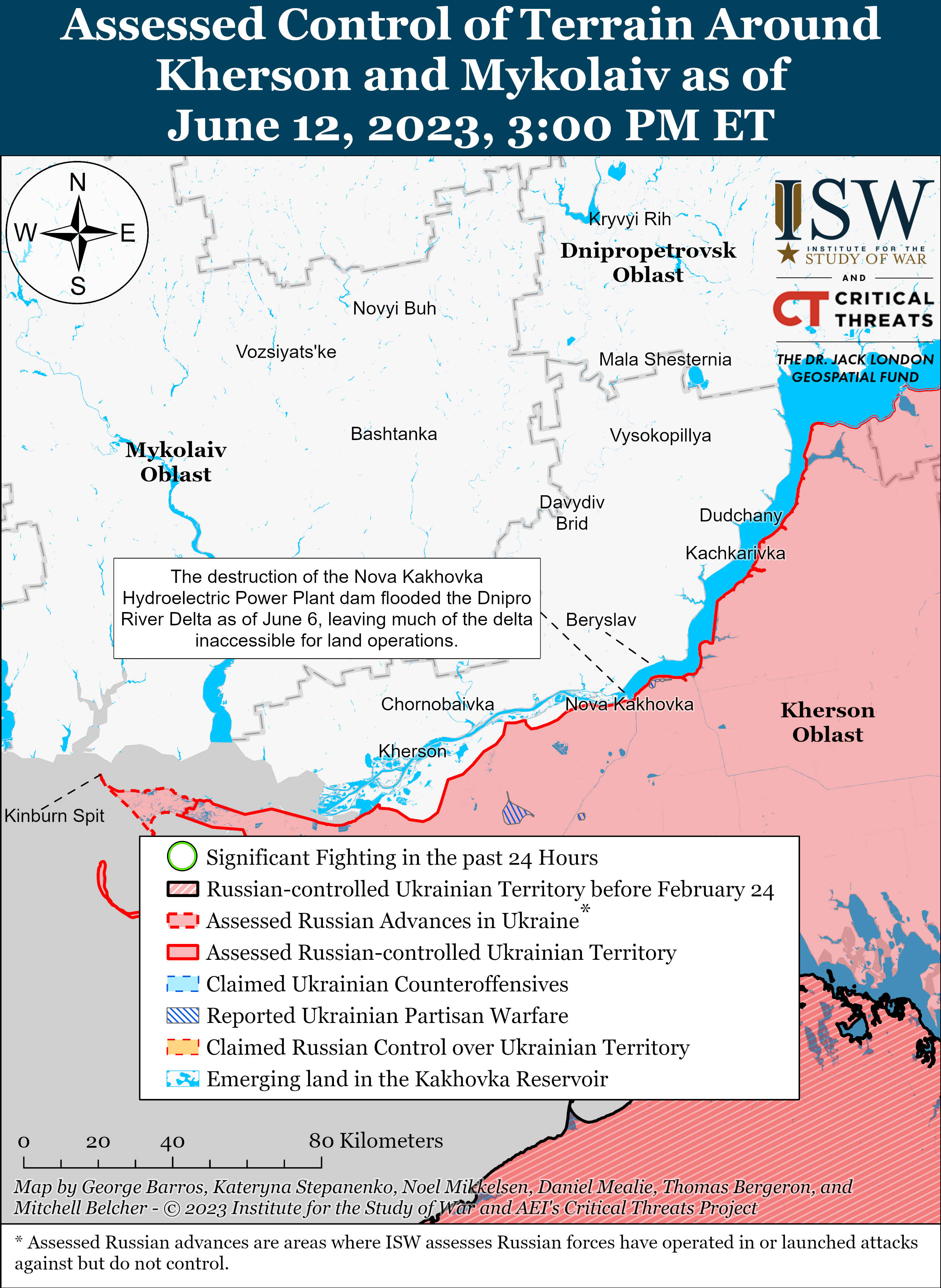Russian Offensive Campaign Assessment, June 12, 2023
AFGHANISTAN, June 12 - Russian Offensive Campaign Assessment, June 12, 2023
Kateryna Stepanenko, Karolina Hird, Grace Mappes, Nicole Wolkov, George Barros, and Mason Clark
June 12, 2023, 5:20pm ET
Click here to see ISW’s interactive map of the Russian invasion of Ukraine. This map is updated daily alongside the static maps present in this report.
Click here to access ISW’s archive of interactive time-lapse maps of the Russian invasion of Ukraine. These maps complement the static control-of-terrain map that ISW produces daily by showing a dynamic frontline. ISW will update this time-lapse map archive monthly.
Note: The data cutoff for this product was 1:30pm ET on June 12. ISW will cover subsequent reports in the June 13 Russian Offensive Campaign Assessment.
Ukrainian forces continued counteroffensive operations in at least three sectors of the front and made territorial gains on June 12. Ukrainian Deputy Defense Minister Hanna Malyar reported on June 12 that Ukrainian forces in the Donetsk and Tavrisk (Zaporizhia) directions have advanced 6.5km and retaken 90 square kilometers of territory over the past week.[1] Malyar added that Ukrainian forces liberated one settlement in western Zaporizhia Oblast and six settlements in eastern Zaporizhia and western Donetsk oblasts in the same period. Ukrainian Eastern Group of Forces Spokesperson Colonel Serhiy Cherevaty stated that Ukrainian troops continued counterattacks on the flanks of Bakhmut and advanced 250 to 700 meters in unspecified areas on the outskirts of the city.[2] Russian sources noted that Ukrainian forces continued counterattacks on Russian positions southwest, north and northwest of Bakhmut, particularly near Berkhivka (3km northwest of Bakhmut).[3] Geolocated footage posted on June 12 additionally indicates that Ukrainian forces have made limited advances in western Donetsk Oblast south of Velyka Novosilka.[4] Russian milbloggers claimed that Russian forces are trying to counterattack in this area and that fighting continued in the western Donetsk-eastern Zaporizhia Oblast area over the course of June 12.[5] Russian milbloggers additionally reported Ukrainian combat activity in western Zaporizhia Oblast near Orikhiv, but noted that the intensity of attacks on this sector has decreased somewhat.[6]
Russian forces reportedly launched a counterattack on June 12 in western Donetsk Oblast following Ukrainian tactical gains near the Vremivka salient on June 11. Russian sources reported that elements of the Russian 127th Motorized Rifle Division (5th Combined Arms Army, Eastern Military District) launched a large counterattack against Ukrainian forces in the Vremivka salient on June 12.[7] Russian forces have made no confirmed territorial gains in these counterattacks as of this publication, though some Russian sources reported that Russian forces recaptured Makarivka (5km south of Velyka Novosilka).[8] Ukrainian Deputy Defense Minister Hanna Malyar reported that Ukrainian forces still control Makarivka as of June 12.[9] A Russian source reported that fighting in the Vremivka salient as ongoing and that the results of the battle are unclear.[10] Ardent nationalist and former Russian officer Igor Girkin claimed that, if true, these reports confirm the success of Russian flexible defense tactics in the area and that the Russian military command cares more about wearing down Ukrainian forces than regaining territory.[11] Girkin claimed that the typical defense of Russian forces is to retreat to rear areas to draw Ukrainian infantry out from Ukrainian air defense and electronic warfare coverage. Girkin claimed that Russian forces then attack the area with tank and air defense support in order to prevent the Ukrainian forces from deploying air defense elements forward to newly gained areas.
Russian milbloggers claimed that poor weather conditions grounded Russian aircraft, impeding Russian defenses against Ukrainian attacks near the administrative border between Donetsk and Zaporizhia oblasts. Russian sources claimed that Ukrainian forces managed to make tactical gains on June 11 due to heavy rain and fog preventing Russian Aerospace Forces (VKS) and army aviation (rotary wing aircraft) from striking Ukrainian force concentrations.[12] Russian sources reported that Russian VKS and army aviation resumed intense airstrikes against Ukrainian forces on June 12 after the rain cleared.[13] Girkin claimed that the weather will play an important role in determining the outcome of operations in this sector in the coming days.[14]
Wagner Group financier Yevgeny Prigozhin announced on June 11 that he had received an order from the Russian Ministry of Defense (MoD) to subordinate his forces to Russian military command.[15] Prigozhin published a claimed segment of the letter from the Russian MoD, which instructs Wagner and other Russian volunteer military formations to inform the Joint Staff of Russian Grouping of Forces about their numbers of forces, reserves, and the supplies they have received from the Russian MoD by June 15.[16] Russian Defense Minister Sergei Shoigu previously announced on June 10 that Russian volunteer personnel must sign contracts directly with the Russian MoD by July 1.[17] Prigozhin later claimed that Wagner is receiving 2.5 times more recruits after the recent “provocative announcements about the need to terminate the existence of Wagner private military company [PMC],” stating that Russian volunteers are joining Wagner to avoid signing contracts with the Russian MoD.[18] Prigozhin accused the Russian MoD of using this formalization effort to harm Wagner amidst the ongoing Ukrainian counteroffensives.[19]
The Russian MoD formalization efforts are likely intended to centralize control of Russian irregular personnel and supplies to respond to Ukraine’s counteroffensive, as well as restrict Prigozhin's independence. A Wagner-affiliated milblogger claimed that Shoigu’s new decree legalizes the destruction of PMCs and that the Russian MoD will use this decree to stop providing Wagner forces with ammunition, medical assistance, and military equipment.[20] A member of the Russian State Duma Defense Committee (and an avid critic of Wagner) Viktor Sobolev claimed that the Russian MoD will not permit volunteers to participate in hostilities without signing a military contract with the Russian MoD, which may make it illegal for Wagner forces to operate on the frontlines.[21] Russian milbloggers implied that the order may allow the Russian MoD to retain contract servicemen longer on the frontlines, as they claim the Russian MoD is less likely to abide by contract periods than PMCs like Wagner.[22] One prominent milblogger claimed that the timing of Shoigu’s announcement is strange given that Ukrainian forces just launched a counteroffensive, and another noted that the Russian MoD is prioritizing bureaucratically eliminating Wagner instead of focusing on the counteroffensive.[23] The Russian military command similarly ordered formalization of the Donetsk and Luhansk People’s Republics’ (DNR and LNR) militias in January and February ahead of the Russian winter offensive.[24] Shoigu and the Russian military command may be leverage possibly regaining some favor with Russian President Vladimir Putin after Russian forces successfully conducted some defensive operations in southern Ukraine to pursue the formalization of Russian irregular forces that they likely originally planned in winter 2023. Prigozhin’s operations on the Bakhmut frontline in winter and spring 2023 and the Russian MoD’s lack of decisive victories in Donbas may have limited the Russian MoD’s ability to pursue its desired formalization of Russian forces. The move is likely militarily sound and in part unrelated to the dispute with Prigozhin, as a formal accounting and direct control of Russia’s array of irregular formations will likely enable the Russian military command to redeploy forces as needed.
Chechen Republic Head Ramzan Kadyrov continues efforts to rhetorically align himself with the Russian MoD and further distance himself from Wagner Group financier Yevgeny Prigozhin. Kadyrov reported on June 12 that several Chechen commanders, including Akhmat Special Forces Commander Major General Apti Alaudinov, met with Russian Deputy Chief of the General Staff Colonel General Alexei Kim to sign a military contract with the Russian MoD that will grant Akhmat forces the same legal status, rights, and benefits as official MoD personnel.[25] Kadyrov emphasized the importance of this contract for the effectiveness of Akhmat troops and claimed that Chechen fighters have been instrumental in supporting Russian operations in Ukraine.[26] Kadyrov’s public display of agreement with the Russian MoD further aligns him and Akhmat troops with the official Russian military apparatus while further distancing Kadyrov from Prigozhin, who notably is pushing back on the MoD contracts as a direct attack on the Wagner Group.[27] Kadyrov will likely continue efforts to curry favor with the MoD as he tries to increase the prominence of Chechen troops.
Key Takeaways
- Ukrainian forces continued counteroffensive operations in at least three sectors of the front on June 12.
- Russian forces reportedly launched a counterattack on June 12 following Ukrainian tactical gains near the Vremivka salient in western Donetsk Oblast on June 11.
- Russian milbloggers claimed that poor weather conditions grounded Russian aircraft, impeding Russian defenses against Ukrainian attacks near the administrative border between Donetsk and Zaporizhia oblasts.
- Wagner Group financier Yevgeny Prigozhin announced on June 11 that he had received an order from the Russian Ministry of Defense (MoD) to subordinate his forces under the Russian military command.
- The Russian MoD formalization efforts are likely intended to centralize control of Russian irregular personnel and supplies to respond to Ukraine’s counteroffensive, as well as restrict Prigozhin's independence.
- Chechen Republic Head Ramzan Kadyrov continues efforts to rhetorically align himself with the Russian Ministry of Defense (MoD) and further distancing himself from Wagner Group financier Yevgeny Prigozhin.
- Russian forces conducted limited ground attacks south of Kreminna.
- Ukrainian and Russian forces conducted limited ground attacks around Bakhmut.
- Russian forces conducted limited ground attacks along the Avdiivka-Donetsk City line.
- Ukrainian forces conducted ground attacks near the administrative border of Donetsk and Zaporizhia oblasts and made gains as of June 12.
- Russian sources reported that Ukrainian forces conducted limited counteroffensive operations southwest of Orikhiv.
- Social media video footage circulated on June 12 reportedly shows Russian barrier troops shooting Russian forces that abandoned their positions somewhere in Ukraine.
- Russia continues to strengthen the legal regime in occupied areas of Ukraine under martial law.
We do not report in detail on Russian war crimes because these activities are well-covered in Western media and do not directly affect the military operations we are assessing and forecasting. We will continue to evaluate and report on the effects of these criminal activities on the Ukrainian military and the Ukrainian population and specifically on combat in Ukrainian urban areas. We utterly condemn these Russian violations of the laws of armed conflict, Geneva Conventions, and humanity even though we do not describe them in these reports.
- Russian Main Effort – Eastern Ukraine (comprised of two subordinate main efforts)
- Russian Subordinate Main Effort #1 – Capture the remainder of Luhansk Oblast and push westward into eastern Kharkiv Oblast and encircle northern Donetsk Oblast
- Russian Subordinate Main Effort #2 – Capture the entirety of Donetsk Oblast
- Russian Supporting Effort – Southern Axis
- Russian Mobilization and Force Generation Efforts
- Activities in Russian-occupied areas
Russian Main Effort – Eastern Ukraine
Russian Subordinate Main Effort #1 – Luhansk Oblast (Russian objective: Capture the remainder of Luhansk Oblast and push westward into eastern Kharkiv Oblast and northern Donetsk Oblast)
Russian forces conducted limited ground attacks south of Kreminna on June 12. The Ukrainian General Staff reported that Russian forces conducted unsuccessful offensive operations near Bilohorivka (10km south of Kreminna) and Vesele (32km south of Kreminna).[28] A Russian source claimed that Russian forces repelled a Ukrainian attack along the Lyman Pershyi-Vilshana line (11km northeast of Kupyansk). Geolocated footage published on June 11 shows elements of the Russian 85th Separate Motorized Rifle Brigade (2nd Luhansk People’s Republic Army Corps) operating near Bilohorivka.[29]
Russian Subordinate Main Effort #2 – Donetsk Oblast (Russian Objective: Capture the entirety of Donetsk Oblast, the claimed territory of Russia’s proxies in Donbas)
Click here to read ISW’s retrospective analysis on the Battle for Bakhmut.
Ukrainian and Russian forces conducted limited ground attacks around Bakhmut on June 12. Ukrainian Eastern Group of Forces Spokesperson Colonel Serhiy Cherevaty reported that Ukrainian forces advanced from 250m to 700m on the flanks of Bakhmut.[30] Ukrainian Deputy Defense Minister Hanna Malyar stated that over the past week, Ukrainian forces have advanced 1.5km on Bakhmut’s left flank and 3.5km on the right flank, retaking a total of 16 square kilometers of territory.[31] A Russian milblogger claimed that Ukrainian forces are storming Berkhivka (6km northwest of Bakhmut) and advancing near Yahidne (1km northwest of Bakhmut) and Klishchiivka (7km southwest of Bakhmut).[32] The Ukrainian General Staff reported in its 0600 situational report that Russian force conducted unsuccessful offensive operations near Ivanivske (6km west of Bakhmut) and Bila Hora (12km southwest of Bakhmut) but did not report fighting around Bakhmut in its 1800 situational report.[33] Footage published on June 12 purportedly shows Russian forces of the 200th Separate Motorized Rifle Brigade (14th Army Corps, Northern Fleet) operating on the flanks of Bakhmut.[34]
Russian forces conducted limited ground attacks along the Avdiivka-Donetsk City line on June 12. The Ukrainian General Staff reported that Russian forces conducted unsuccessful offensive operations near Avdiivka and Marinka.[35] Chechen Republic Head Ramzan Kadyrov posted footage reportedly of Chechen “Sever-Akhmat” forces operating in the Marinka direction.[36] Footage published on June 12 purportedly shows the 110th Separate Motorized Rifle Brigade (1st Donetsk People’s Republic Army Corps) operating near Krasnohorivka (5km north of Marinka).[37] The Russian MoD claimed that Russian forces repelled two Ukrainian attacks north of Avdiivka.[38] A Russian milblogger claimed that Ukrainian forces conducted unsuccessful assault operations near Opytne (3km southwest of Avdiivka) and Vodyane (7km southwest of Avdiivka).[39]
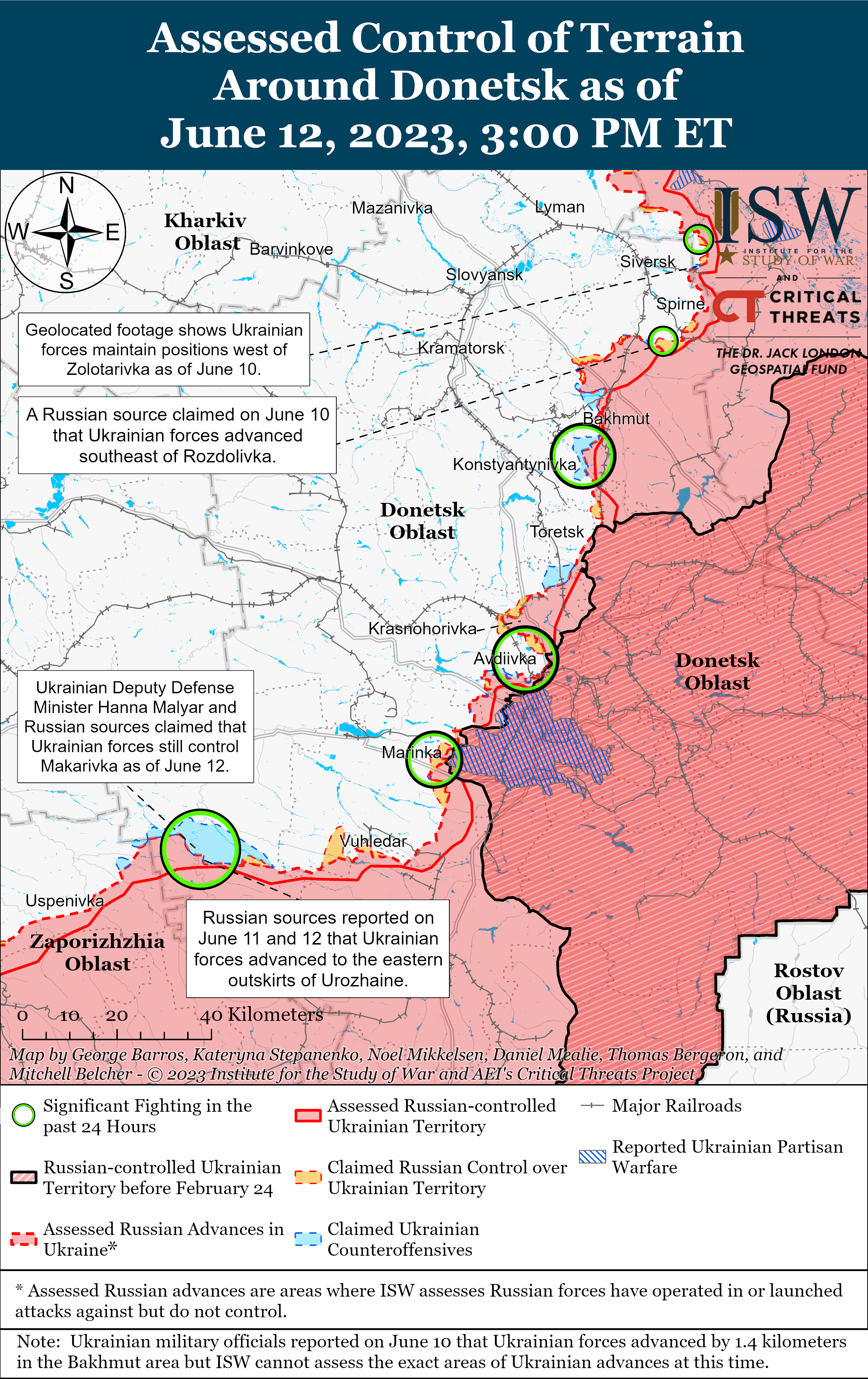
Russian Supporting Effort – Southern Axis (Russian objective: Maintain frontline positions and secure rear areas against Ukrainian strikes)
Ukrainian forces conducted ground attacks near the administrative border of Donetsk and Zaporizhia oblasts and made gains as of June 12. Geolocated footage shows that Ukrainian forces advanced to positions west of Novodonetske (11km southeast of Velyka Novosilka).[40] Ukrainian Deputy Defense Minister Hanna Malyar and other Ukrainian official sources confirmed on June 12 that Ukrainian forces liberated areas south and southwest of Velyka Novosilka, including Levadne (20km southwest), Novodarivka (15km southwest), Neskuchne (immediately south), Storozheve (3km south), Blahodatne (3km south), and Makarivka (5km south).[41] These statements refute Russian claims that the 127th Motorized Rifle Division (5th Combined Arms Army, Eastern Military District) recaptured Makarivka as well as claims that Novodarivka is still contested as of June 12.[42] Russian milbloggers claimed that Ukrainian forces continued to counterattack and advance south of Makarivka on June 12.[43] Some Russian milbloggers claimed that Ukrainian forces advanced five to six kilometers south of Makarivka and that Russian forces fell back as far as 10 kilometers south of Velyka Novosilka.[44] Milbloggers also reported continued Ukrainian counterattacks southwest of Velyka Novosilka.[45] One milblogger reported that the status of Russian positions in Rivnopil (9km southwest of Velyka Novosilka) is unclear and that Russian forces may have to withdraw from the settlement due to Ukrainian advances east of Rivnopil and south of Velyka Novosilka.[46] Russian and Ukrainian sources claimed on June 12 that Russian forces destroyed a dam on the Mokry Yaly River south of Velyka Novosilka on June 11, after Russian sources initially claimed that Ukrainian forces blew the dam.[47] Milbloggers claimed that the “Storm” detachment of the Russian 40th Naval Infantry Brigade (Pacific Fleet) captured abandoned Western armored vehicles southeast of Velyka Novosilka.[48]
Russian sources reported that Ukrainian forces conducted limited counteroffensive operations in western Zaporizhia Oblast on June 12. Russian milbloggers claimed that Ukrainian forces conducted sabotage and reconnaissance along the front line in the Orikhiv area.[49] Other Russian milbloggers claimed that Ukrainian forces have conducted relatively few counterattacks in the Orikhiv area, and that Russian aviation used guided aerial bombs to strike Ukrainian reserves in the area.[50] Ukrainian Deputy Defense Minister Hanna Malyar confirmed that Ukrainian forces liberated Lobkove (26km southwest of Orikhiv) on an unspecified date.[51] A Russian milblogger claimed that the Russian 417th Reconnaissance Battalion (42nd Motorized Rifle Division, 58th Combined Arms Army, Southern Military District) is operating on the first line of defense in the Robotyne-Verbove direction south and southeast of Orikhiv.[52] Some Russian sources claimed that Russian forces repelled small Ukrainian sabotage and reconnaissance groups south of Hulyaipole overnight on June 11 to 12.[53]
Russian Mobilization and Force Generation Efforts (Russian objective: Expand combat power without conducting general mobilization)
Social media video footage circulated on June 12 reportedly shows Russian barrier troops – specialized units that threaten to shoot their own retreating personnel or compel offensives – shooting Russian forces that abandoned their positions somewhere in Ukraine.[54] ISW is unable to confirm whether the footage is authentic at this time. The United Kingdom Ministry of Defense reported in November 2022 that Russian forces in Ukraine probably started deploying “barrier troops” and “blocking units” to Ukraine and that Russian generals likely want their subordinate commanders to shoot deserters, including possibly authorizing personnel kill their own deserting servicemen.[55]
Russian forces are deploying coastal missile systems to Bryansk Oblast. The Ukrainian Resistance Center reported, citing local partisans, that Russian forces transferred a division of the “Bal” costal missile system to Bryansk Oblast from its permanent dislocation in Utash, Krasnodar Krai.[56] The Resistance Center noted that these systems belong to the Russian 11th Separate Coastal Missile and Artillery Brigade of the Black Sea Fleet, and that Russian forces will use these coastal systems to strike surface targets due to lack of other missile systems. The Resistance Center noted that “Bal” systems use Kh-35/35U missiles that have an increased strike range of 500km after modernization in 2021.
The Russian military command is reportedly deploying more conscripts to Russian regions bordering Ukraine. Relatives told a Russian independent outlet Mobilization News that the Russian military command is deploying conscripts from the Russian 96th Separate Reconnaissance Brigade (1st Guards Tank Army, Western Military District) from Nizhny Novgorod to Moscow Oblast and later to the border areas of Belgorod or Bryansk oblasts.[57] One mother reported that mobilized personnel are currently training conscripts in Moscow Oblast and that conscripts will depart for border areas on June 13.
Ukrainian officials reported that Russian forces continue to suffer from high casualties and low morale. The Ukrainian General Staff reported that there has been an increase in desertion cases among Russian “Storm-Z” assault units, and that Russian forces are continuing to suffer significant casualties in the Bakhmut area with 50 servicemen arriving at a military hospital in Perseanovka, Rostov Oblast.[58] The Ukrainian General Staff also reported that 25 Russian servicemen deserted from Mariupol and Novoazovsk due to “unofficial suspension of vacations” that were originally promised by the Russian leadership.[59]
Activities in Russian-occupied areas (Russian objective: Consolidate administrative control of annexed areas; forcibly integrate Ukrainian civilians into Russian sociocultural, economic, military, and governance systems)
Russian authorities continue to struggle with the implementation of a border regime between occupied Ukraine and Russia. Ukrainian Luhansk Oblast Head Artem Lysohor reported on June 12 that Russian authorities are continuing inspections at the border between Mylove, occupied Luhansk Oblast, and Rostov Oblast, despite the fact that under Russian law Luhansk and Rostov are different regions of the same country.[60] Lysohor also noted that Russian authorities are checking for both Russian passports and local registration at border crossing points.[61]
Russia continues to strengthen the legal regime in occupied areas of Ukraine under martial law. Russian media reported on June 11 that the Russian State Duma may consider amendments to the Code of Administrative Offensives that would introduce administrative liability of a 500-1,000 ruble ($6 to $12) fine or arrest for up to 30 days for violating the martial law regime.[62] As ISW has previously reported, martial law is operating in the occupied parts of Kherson, Zaporizhia, Donetsk, and Luhansk oblasts, occupied Crimea, and Russian border regions.[63] Russian authorities have recently undertaken various measures to strengthen legal controls over areas of Ukraine under martial law.[64]
Significant activity in Belarus (Russian efforts to increase its military presence in Belarus and further integrate Belarus into Russian-favorable frameworks).
ISW will continue to report daily observed Russian and Belarusian military activity in Belarus, as part of ongoing Kremlin efforts to increase their control over Belarus and other Russian actions in Belarus.
Nothing significant to report.
Note: ISW does not receive any classified material from any source, uses only publicly available information, and draws extensively on Russian, Ukrainian, and Western reporting and social media as well as commercially available satellite imagery and other geospatial data as the basis for these reports. References to all sources used are provided in the endnotes of each update.
Legal Disclaimer:
EIN Presswire provides this news content "as is" without warranty of any kind. We do not accept any responsibility or liability for the accuracy, content, images, videos, licenses, completeness, legality, or reliability of the information contained in this article. If you have any complaints or copyright issues related to this article, kindly contact the author above.

